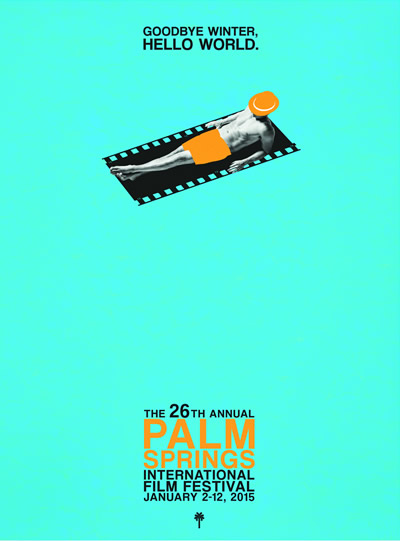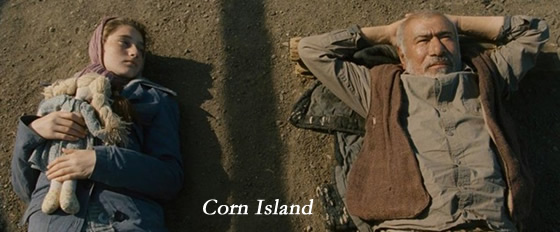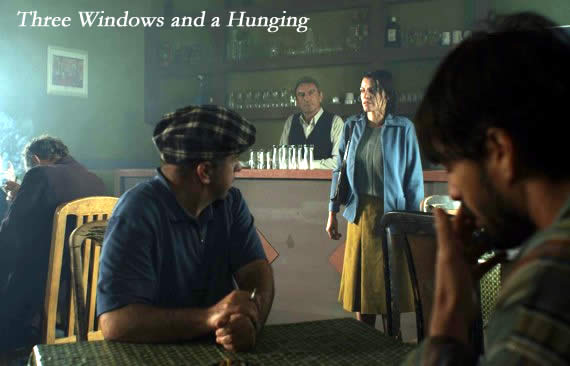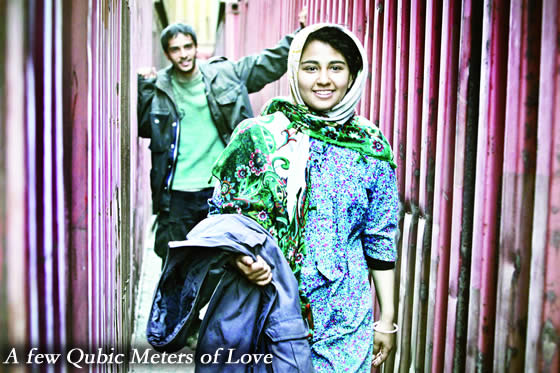 The 26th edition of Palm Springs International Film Festival will open on January 2nd 2015 and will run until January 12th. It’s a Cinema Without Borders tradition to have a conversation with Director of the Festival every year and before start of the festival.
The 26th edition of Palm Springs International Film Festival will open on January 2nd 2015 and will run until January 12th. It’s a Cinema Without Borders tradition to have a conversation with Director of the Festival every year and before start of the festival.
Bijan Tehrani: What is the secret to the success of the Palm Springs International Film Festival?
Darryl Macdonald: Really I guess there is only one thing I can point to, and that it is the films. The quality of the line-up and the way the festival audiences perceive the specific films in the festival is all important. It is not about big names attached to the films, it is not about Hollywood, it is about the overall quality of the films that you program for the festival. Over the course of particularly the last decade, this festival has become one of the three largest in the country: we had over 135,000 film goers last year and, apart from that, there are a large number of feature films from 65 different countries around the world. It’s the excellent level of quality; the quality in the storytelling, and the quality of those stories themselves that the line-up represents, so the audience keeps coming in greater numbers every year.
BT: I have been going to the festival since 2007 and I’ve always been impressed with the audience interaction. The way the festival treats filmmakers and audiences makes it a very friendly atmosphere.
DM: I would not argue with that. I have always been struck by how intelligent the audience is for the Palm Springs Film Festival and the high level of dialogue between the audience and the filmmakers after the screenings. It has been marked by the filmmakers who attend the festival and most people come here not expecting that since Palm Springs is an ideally vacation community, but our audience comes from all over California and the US in general and these are true film lovers. They come here to not just have a vacation, but to have a cultural vacation so they can combine being in this idealism community with seeing the best in world cinema, having all of these incredible experiences, having dialogue with these filmmakers, and it all kind of fits together and it is great programming as well. We have created an atmosphere where fans and filmmakers can come together and instantly relax, which is harder to do in a big city with a big city festival. There is also something spiritual and special about Palm Springs itself that is conducive to something like a film festival, and people want to come back year-after-year and spread the word.
BT: It is always interesting to see the column of world cinema at Palm Springs. Can you tell us about the presence of world cinema at this year’s festival?
DM: Well it has certainly never been more varied. We have films from Afghanistan, Latvia, Lebanon, Kosovo—in addition to great films from the usual suspects—and of course films from here in the US as well. That is part-and-parcel the key to the broad overview of the best of what is going on, and because we are not a thematic festival and focused on American independent film, most of them are not in any particular ethnic or individual countries and we can capitalize that and boil down the essentials and the thematic drive. I think this kind of programming reflects well to the interests of our audience and we are looking to put together a team of programmers that has widely divergent areas of specialty when it comes to cinema, and are very focused on their own areas but can come together and coalesce a general sense of what quality cinema is at the same time.
BT: Tell us about the guest filmmakers attending the festival this year.
Darryl: Our last count we were at 138 filmmakers connected with the films in this year’s festival line-up, and I expect it to keep going up each year. We still have a couple weeks before the festival starts, so that number may grow.
BT: Audiences are surely looking forward to the Awards Gala, as well as the many other festival events. What are festival-goers in store for? DM: Every year, one of the key events of the festival is our Awards Gala. While the rest of the festival is devoted to awarding world cinema, that night we highlight the best and brightest performances, directorial efforts and so-on from current cinema, so we have awards for the best actors, actresses, directors, composers, and more. We have Julian Moore, Eddie Redmayne, J.K. Rowling and the list continues. As I said, this festival caters to every type of interest when it come to the cinema and tries to provide a really diverse overview of world cinema and that, of course, includes the Hollywood movies and hit movies and it will include big blockbuster and sc-fi films. Aligned with the Awards Gala are other events that we do. We will present screenings of films and then have intimate on-stage dialogues with the directors, which are all moderated by film journalists, and it really gives you a peek behind the scenes of these films and the makings of these filmmakers’ careers. We will also have directors who were shortlisted for the Best Foreign Film Category of the Academy Awards. Later on in the festival we have a special program focusing on Citizenfour, one of the strongest documentaries we have seen in a few years. Laura Poitras, the director of the film, will be here on stage after the screening of the film for an in depth interview and to talk about corporate and government intrusion into our private lives.
DM: Every year, one of the key events of the festival is our Awards Gala. While the rest of the festival is devoted to awarding world cinema, that night we highlight the best and brightest performances, directorial efforts and so-on from current cinema, so we have awards for the best actors, actresses, directors, composers, and more. We have Julian Moore, Eddie Redmayne, J.K. Rowling and the list continues. As I said, this festival caters to every type of interest when it come to the cinema and tries to provide a really diverse overview of world cinema and that, of course, includes the Hollywood movies and hit movies and it will include big blockbuster and sc-fi films. Aligned with the Awards Gala are other events that we do. We will present screenings of films and then have intimate on-stage dialogues with the directors, which are all moderated by film journalists, and it really gives you a peek behind the scenes of these films and the makings of these filmmakers’ careers. We will also have directors who were shortlisted for the Best Foreign Film Category of the Academy Awards. Later on in the festival we have a special program focusing on Citizenfour, one of the strongest documentaries we have seen in a few years. Laura Poitras, the director of the film, will be here on stage after the screening of the film for an in depth interview and to talk about corporate and government intrusion into our private lives.
BT: I have noticed that every year, more attention is paid to the awards given at the ceremony and the ceremony has been mentioned by major media outlets. What do you think of this progression?
DM: The acclaim of the awards have spread worldwide. In-fact, a well-known French filmmaker was asked about his film’s nomination at our festival and he was very excited. He also noted that if a filmmaker’s film will be shown at Palm Springs, then every filmmaker should attend. I say this not to toot our own horn, but I say it because it surprises me. I don’t know what to attribute it to other than the filmmakers and film industry that have come to the festival from all over the world. We used to have to fight for films, now they come to us. Something in the zeitgeist has happened where we have put in enough hard work into an event of quality and it has now gotten easier and we have garnered growing acclaim and growing coverage.
BT: A lot of our readers from outside of Palm Springs have inquired about the best way to guarantee a place at a screening.
DM: Our line-up is now live online at palmspringsfilmfest.org. You can read a description of any film in the festival and buy advanced tickets and packages. That is really the easiest way. You can call the festival as well and you can also visit the festival and buy tickets day-of. We also offer discounted hotel rates on our website. Film fans have a lot to choose from when it comes to screenings and events. We will be doing a special focus this year on the films of Eastern Europe, it is one of the most exciting areas of world filmmaking right now—there is an explosion of talent emanating from this region. The films themselves are remarkable, major prize winners from the Cannes Film Festival and other top festivals in the world. Many of them are created by first and second time filmmakers. We are also doing a special program called The Power of Words: Book to Screen, which is a symposium on books being adapted into screenplays, and that is a two day program. We will be screening a number of films in the symposium the following day, and you can read that online. We are also having an event with younger film-goers and we have selected roughly two dozen films for a showcase called Breaking Waves which includes great storytelling and very well made works all done by filmmakers making their first or second film. These films are in reaction to the dominance of American films in the world cinema realm, so they are developing their story in different ways and trying to mix genres to create a new genre entirely.

